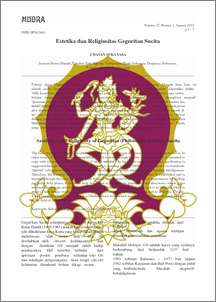I WAYAN , SUKA YASA
(2012)
Aesthetics and Religiosity of Geguritan (Philosophical Verse) Sucita.
Mudra (JURNAL SENI BUDAYA), 27 (1).
p. 1.
ISSN 0854-3461
![[img]](http://repo.isi-dps.ac.id/style/images/fileicons/application_pdf.png)  Preview |
|
PDF (Aesthetics and Religiosity of Geguritan (Philosophical Verse) Sucita)
- Published Version
Download (368kB)
| Preview
|
Abstract
The basic principle of Geguritan (philosophical verse) as a literary discourse is religious contemplation. In other words, it is a religious contemplation which is done through literary work and which is intended to cope with adyatmika duhka ‘the impact of moral sadness’. As far as this term is concerned, purification is suggested through what is referred to as yoga sastra: learning reading ‘literary work’ (nyastra) to transform
‘egoism’ (ahangkara) into ‘sensitive feeling’ (rasa), and emotional, intellectual and spiritual intelligences. Therefore, the learning model referred to as ‘mental consciousness exercise’ (jnana) is established and is narrated through the roles played by plots referred to as tirtayatra (purification of performance by visiting particular holy places to bathe in holy water and to obtain holy inspiration and discourse) which gives information on yoga sastra treatment. In accordance with self purification, sekar alit is an ‘offering which is made of holy magic words of dedication and is performed by singing what is referred to as yantra. Finally,
it was found that Geguritan Sucita is a Hindu literary work which qualified for a great work (mahakavya)
in the field of Bali sekar alit.
Keywords: Sekar alit, yoga sastra and Geguritan Sucita.
Actions (login required)
 |
View Item |


